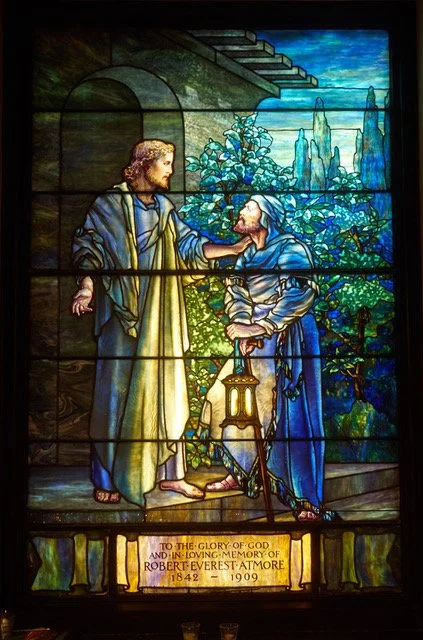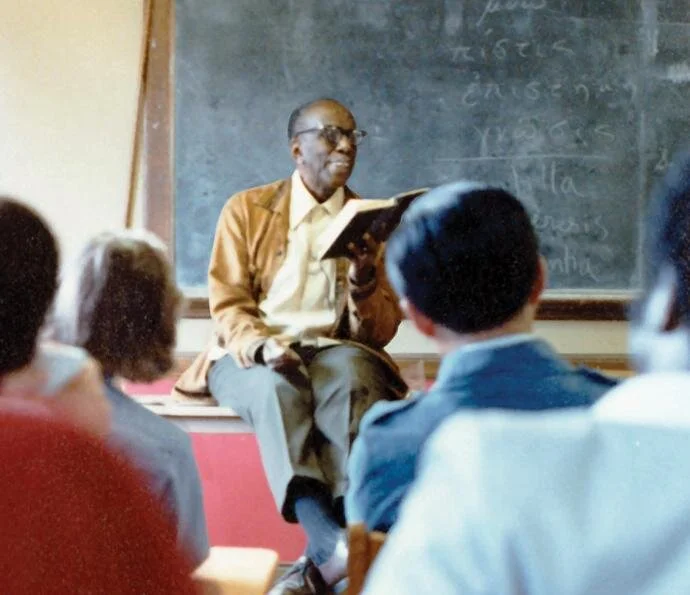On the Spiritual Life after the Darkness of Covid-19, Part Four: on Healing
Healing means, first of all, allowing strangers to become sensitive and obedient to their own stories. Healers, therefore, become students who want to learn, and patients become teachers who want to teach.
—Henri Nouwen, Reaching Out, p. 96
Photo of Henri Nouwen (left) with Jean Vanier in 1987 (photo source)
I. We have come to Part Four of this series on the spiritual life as illuminated by Henri Nouwen.
Last week, I explained what I felt was the need to flip the original order from Prayer, Solitude, Healing, and Ministry to Prayer, Solitude, Ministry, and Healing. During this week, I came to realize a much deeper connection between Ministry and Healing. Especially important, I think, are the relationships between and among the people involved in the interconnections between ministry and healing, and the basis on which these relationships are formed.
II. It is important to understand that what Henri Nouwen means by “healing,” is spiritual healing and the care of the soul. This is of interest to us because 75 years ago, Saint Stephen’s—our church--was known as a national center of a ministry of spiritual healing. Over the course of a typical year, huge numbers of pilgrims came to attend healing services and ecumenical conferences on spiritual healing, and to seek individual counsel. This ministry was taken very seriously by the pilgrims seeking relief from their many spiritual, and often physical and emotional struggles. There was nothing odd or mysterious about the services of healing, nothing inauthentic, nothing false. If anything, the many thousands of people who came annually to Saint Stephen’s for spiritual healing came with deep faith and a conviction that God would hear their petitions.
III. The healing ministry of the mid-20th Century was meant to be a connection between God and the petitioner. The “minister” (usually an ordained clergy person) was a kind of “middle person” who would offer the prayers and petitions on behalf the person seeking spiritual healing. There was no mutuality, no sharing of the roles of “teacher” and “learner,” as Nouwen urges us to consider in the passage above. Indeed, it would not be inaccurate to suggest that there was a certain degree of personal detachment in the ritual of spiritual healing services because there were so many people “to heal.” The vast numbers of pilgrims coming to the church made authentic personal connections between the priest and the person seeking healing, almost impossible. The intimacy that has come with current practices of spiritual healing establish a more personal connection between the healer and the person seeking healing, a connection that was mostly atypical in the early Saint Stephen’s healing ministry, primarily because of the size and scope of the program. Given such numbers, it was almost impossible to achieve the more personal connection between the healer (priest/minister) and the person seeking healing that Nouwen describes.
IV. From the very beginning of his own ministry as priest, psychologist, academic, theologian, preacher, teacher and witness, Henri Nouwen understood that not only are we all “wounded” but that in and through this “woundedness,” we all can become spiritual healers. In my own spiritual life, Nouwen’s two most important writings were his little book on Thomas Merton, Pray to Live: Thomas Merton, Contemplative Critic (1972) and The Wounded Healer: Ministry in Contemporary Society (1972). These were also the first Nouwen books I read, and, through them, I discovered that nothing was more important to him than the care of the soul, a kind of care that was grounded in spiritual healing. For Nouwen, the implications of this insight were deeply important:
From the point of Christian spirituality, it is important to stress that every human being is called upon to be a healer. Although there are many professions asking for long and arduous training, we can never leave the task of healing to the specialist. In fact, the specialists can only retain their humanity in their work when they see their professions as a form of service which they carry out, not instead of, but as part of, the whole people of God. (Reaching Out, p. 93)
V. What does this mean for us as individual Christians, especially in this time of the emergence of the dangerous COVID-19 Delta variant? As of today, July 28, nationwide, new daily cases of COVID-19 have risen to 67,000, an increase of 146% over the previous 14 days. And as of July 28, the total number of reported cases of COVID-19 is 34,765,992; the total number of reported deaths is 611,708. This is the context in which we ought to see ourselves as healers, as individuals who can teach and learn from those who might seek us out for even the most basic elements of spiritual care. Our own “healing ministry” could include adding our voice and our actions to the continuing battle to eradicate COVID-19. This means that we listen with what Nouwen calls a “compassionate heart, a heart that does not judge or condemn but recognizes how the stranger’s story connects with our own.” (Reaching Out, p.96). Nouwen reminds us again that we are, ourselves, wounded and that in our woundedness—whatever it is, however it is shaped- we can offer spiritual healing of some kind, a healing of kindness, compassion and understanding and, in doing so, can bring ourselves and those seeking healing closer to God. This is a very different dynamic from the healing ministry of Saint Stephen’s 75 years ago. It is a way of ministering for which we all can take some responsibility.
VI. Nouwen’s illumination of a strong and healthy spiritual life can only be lived and practiced in,and, out of, what poet Stanley Kunitz calls the “dailiness of life.” And for Nouwen, this means that we take “a careful look at the way we think, speak, feel, and act from hour to hour, day to day, week to week, and year to year, in order to become more fully aware of our hunger for the spirit.” (Making All Things New, p. 21) This also means that we must pay daily attention to Prayer and Solitude. Indeed, it is the integration of Nouwen’s four elements that is essential if we are to practice a ministry of spiritual healing.
VII. We give Henri Nouwen the last words of these last four Friday Reflections:
All ministry is caring attentiveness to vulnerable lives, and a grateful receiving of the variety of fruits by which they manifest their beauty. (Lifesigns/Compassion, p. 72)
Yes, all ministry is being willing to take care of vulnerable lives in our everyday practice of spiritual healing and the care of souls, whatever form that care takes.
—Amen
[My colleague, Suzanne Glover Lindsay, has written a wonderfully expansive Friday Reflection on the important heritage of Saint Stephen’s and its connection to the development of “Spiritual Healing” in the early 20th Century in England and to mid-20th Century social justice in the United States. You can find that reflection here.










